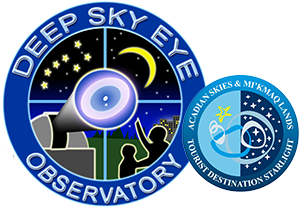Stellar Narrative
It's been a rather low-key week at the observatory, thanks to unsettled skies that bring considerable cloud in the evenings, then clear much too late for visitors to enjoy many observing sessions. One night, however, offers perfection. The stars move in their courses and a small group arrives to look at them. Afterwards, Tim shows me how to image with his Televue refractor. My assignment is to process a test frame just to see how it turns out. We choose the Lagoon Nebula for this introduction to Refractor Imaging 101 and I must admit that I feel a bit out of my depth in these waters. Still, it becomes what is usually called "a learning experience". I learn that imaging demands a serious level of commitment and a considerable store of knowledge. Tim learns that stubborn old ladies don't always master a new skill on the first try, or most likely not on the tenth try either. I will think back and replay this lesson, then decide I'll probably need another go at it. Nothing is intuitive about this particular pursuit.
It well may be that I'm a landscape astrophotographer at heart, more comfortable with catching the Milky Way as it spans the night - or Orion as he strides above the evergreens when autumn begins. It's exciting for me to anticipate meteor showers and set up my camera in the hope of freezing a bright streak or two. I imagine these pea-specks, shaken off a comet's tail perhaps, drawn to their doom by gravity. They die in brilliance. Theirs is no ordinary passing.
But for now, I spend time alone with myself, since I'm not needed to assist with these few people. Even a reflected planet in a pool of still water gives me cause for an indrawn breath. Mars is rising golden, closer than it will be again for thousands of years. I take a dozen shots, praying for the right composition, the perfect blend of earth and air. Down by the Quinan River, I wander as I wait for my instruction after everyone else has left, and listen to their happy chat. Astronomy brings both awareness and celebration. The enormity of space can be a frightening thought. We shrink to less than a meteor grain. Our own trails are brief. Yet we dance like moths to light in all its manifestations. We raise our eyes to the universe and laugh, because we're here, and human, and very much attuned to our lives. And with every guest who gasps in wonder at these crystalline stars (for many never see such glory from their urban homes), I become more aware of my good fortune. I am more determined to capture something beyond the Milky Way, after all; to look above, through and beyond.
And therein lies the telescope's magnetism. Unlike a camera lens, it can bring me closer to something "beyond the fields we know", to borrow from Lord Dunsany. Science makes reality of magic. What the ancient philosophers could merely imagine, we can see for ourselves. What they were forced to speculate, we can prove. For them, the only lagoons were enclosed by sand or coral, cradled in the sea. For me, there's another lagoon with rosy streamers of nebulosity - the stuff of unborn stars I will never see.
I'll close with one of my poems, which probably needs a quick explanation. In 2014, astronomers discovered the oldest known star in the universe. Its age could be quite accurately determined - dating back to only about 100 million years after the Big Bang itself. This fascinated me at the time and from that story, a poem was born - but I didn't even have access to a scope when I wrote it, so I used an imaginary reflector. Poetic licence and so on. Science is art too. There are many kinds of perception.
Still, I write in my personal language and the sky answers in another. It speaks in tongues of fire, punctuated by dust. I will continue studying this code and perhaps translate some of it. If not, I can just pretend that I know all the words.
Caught in the Light Bucket
SM0313 - age 13.6 billion years
When this beam first began, God may have slept
between the newest universe and the last. We give
a holy name to him; we credit his hands. The Sistine
finger tempts us with fires from no fires; lands
from no lands; suns wheeling backward
unsparked, to edges where nothing matters,
where matter is nothing.
All dross has vapoured away - time's scintillae,
just like mine. Water and air now. I release gravity
from my arms; the scope sings, deep as rubbed glass.
We both listen to harmonics of the plasmic jar
while night brushes against us: its alto hum,
shushing around the observatory. Sky's voice.
Then quiet.
I cant the reflector barrel, apply an eye,
as this oldest star in the cosmos waggles
its corona within my Milky Way - scooped up,
a spaceborn orphan that has since outlived every
possible parent it might have claimed.
I have drawn it now, too, from the rift between
where it started and where it needs to go.
Brenda Levy Tate
The Milky Way above the Quinan River not far from the Dome.

